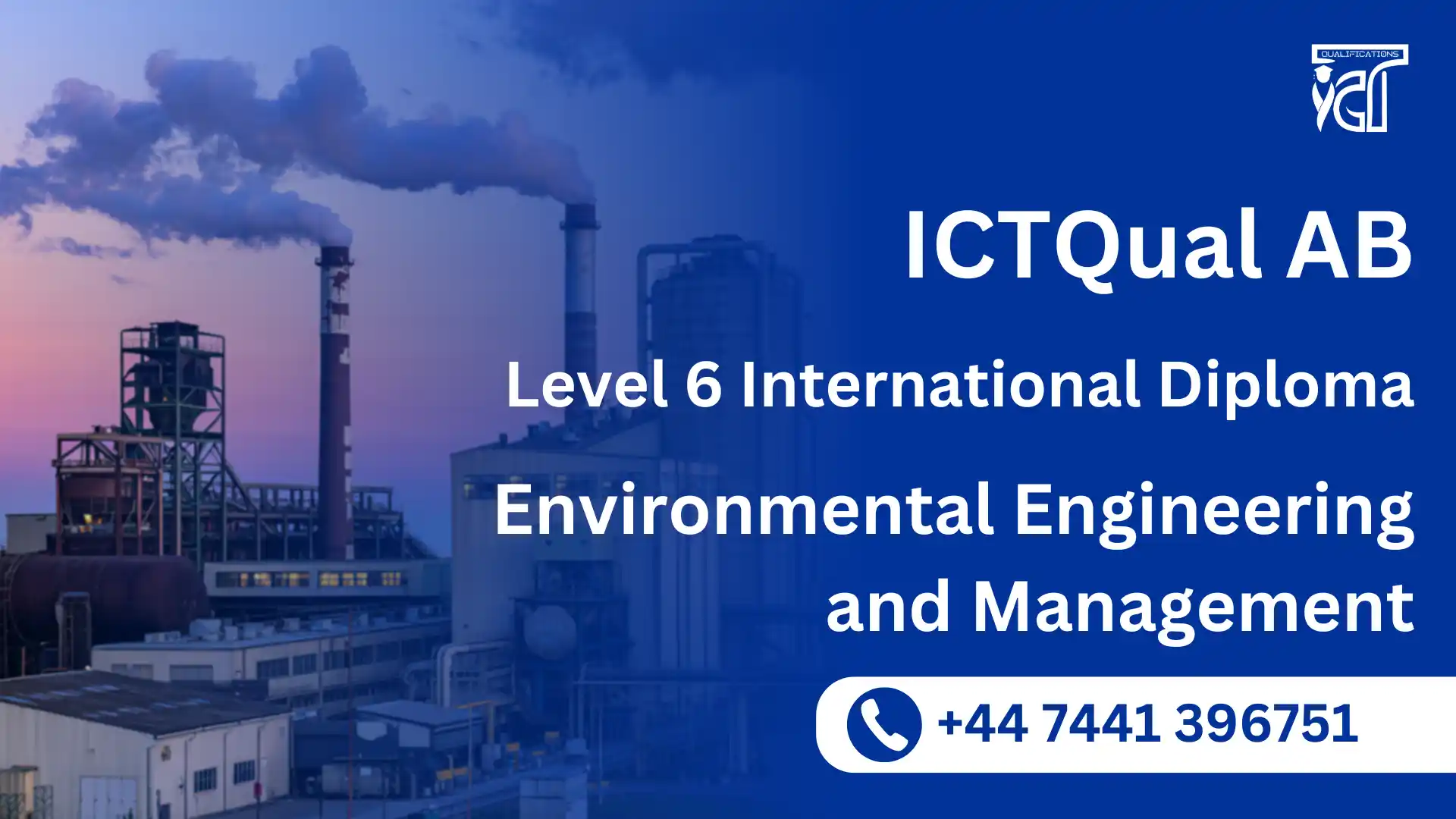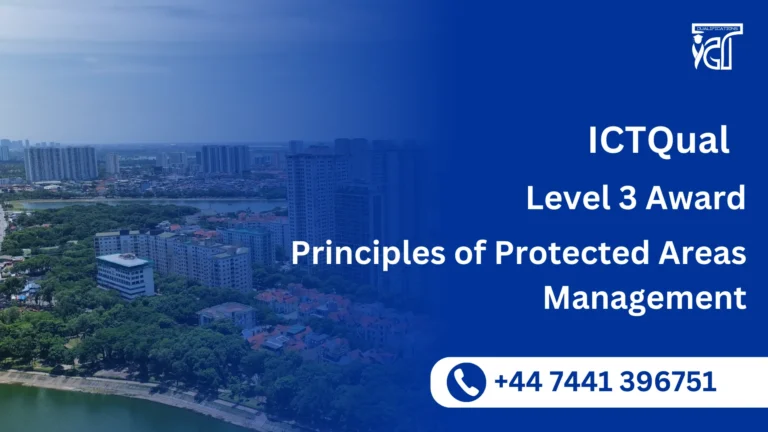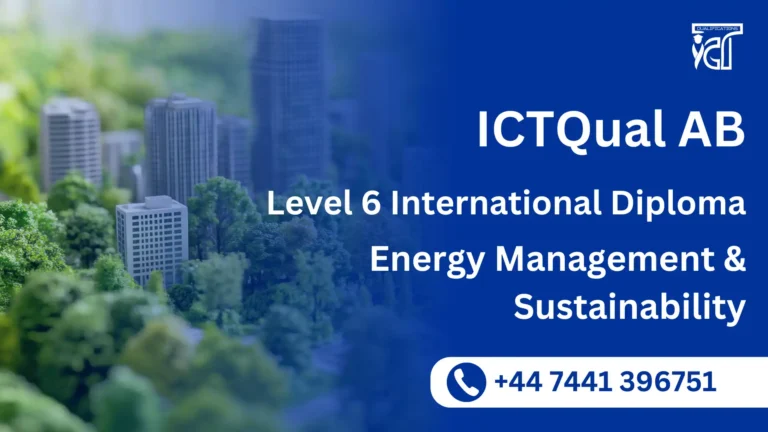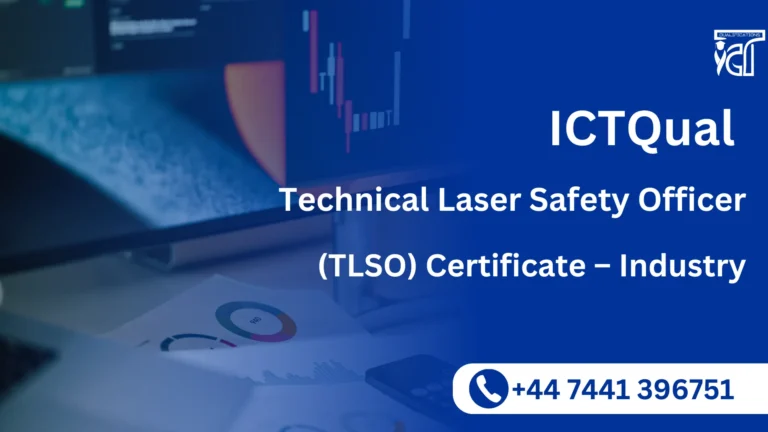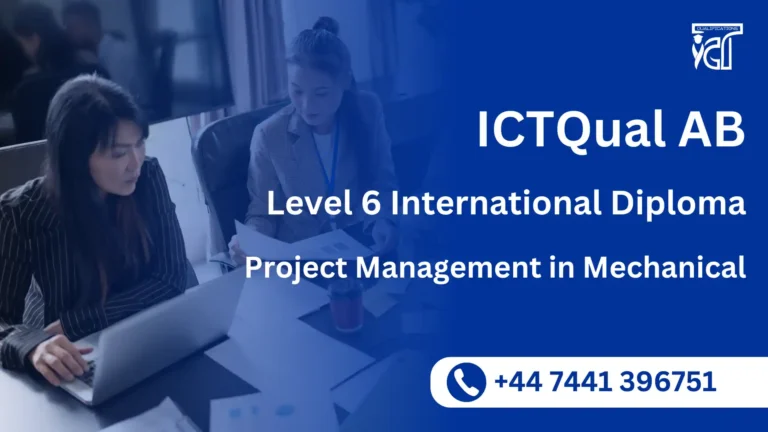The ICTQual AB Level 6 International Diploma in Environmental Engineering and Management is a globally recognised qualification designed for learners who wish to excel in one of today’s most critical and fast-growing sectors. With the world placing increasing emphasis on sustainability and responsible resource management, this advanced programme equips learners with the specialist knowledge and practical skills needed to address complex environmental challenges across industries.
Spanning three years of structured study and carrying a comprehensive 360-credit framework, the diploma blends academic depth with practical applications. Learners will explore core areas such as environmental technologies, sustainable development strategies, pollution control, waste management, and regulatory compliance. The course also emphasises leadership, decision-making, and innovative problem-solving—skills that are highly valued in both private and public sector organisations worldwide.
Whether you are a fresher seeking a solid entry into the field of environmental engineering, or an experienced professional aiming to strengthen your expertise and career prospects, this programme offers exceptional value. Graduates can progress into rewarding roles such as environmental managers, sustainability consultants, regulatory advisors, or project leaders in green infrastructure and renewable energy initiatives.
By completing this diploma, learners gain not only a strong professional foundation but also the confidence and competence to contribute meaningfully to global sustainability goals. The programme’s international relevance ensures that learners are well-prepared to pursue diverse opportunities in industries where environmental stewardship and innovation are central to long-term success.
ICTQual AB Level 6 International Diploma in Environmental Engineering and Management
This qualification, the ICTQual AB Level 6 International Diploma in Environmental Engineering and Management, consists of 36 mandatory units.
Year 1 – Foundation of Environmental Engineering and Management
- Principles of Environmental Engineering
- Introduction to Environmental Science and Sustainability
- Environmental Legislation and Regulatory Compliance
- Environmental Impact Assessment (EIA) Fundamentals
- Waste Management and Pollution Control
- Water Quality Management and Treatment
- Air Quality Monitoring and Control
- Soil and Groundwater Protection
- Renewable Energy Systems and Applications
- Occupational Health, Safety, and Environmental Awareness
- Communication and Reporting in Environmental Management
- Professional Ethics and Responsibility in Environmental Practice
Year 2 – Applied Environmental Engineering and Management
- Advanced Environmental Risk Assessment
- Industrial Wastewater and Effluent Management
- Solid and Hazardous Waste Engineering
- Environmental Monitoring and Audit Techniques
- Sustainable Resource Management and Conservation
- Climate Change Mitigation and Adaptation Strategies
- Environmental Modelling and Data Analysis
- Green Building and Sustainable Infrastructure
- Environmental Management in Manufacturing and Energy Sectors
- Behavioural and Organisational Approaches to Environmental Safety
- Digital Tools and Technologies in Environmental Engineering
- Research Methods and Environmental Project Planning
Year 3 – Strategic Environmental Leadership and Management
- Strategic Environmental Management and Governance
- Integrated Environmental Management Systems (ISO 14001, ISO 50001)
- Environmental Policy Development and Implementation
- Sustainability Leadership and Corporate Social Responsibility (CSR)
- Environmental Risk Management in Large-Scale Projects
- Renewable Energy Project Management
- International Environmental Standards and Best Practices
- Environmental Innovation and Emerging Technologies
- Environmental Crisis Management and Emergency Planning
- Advanced Occupational Health & Environmental Wellbeing Strategies
- Independent Research Project in Environmental Engineering
- Capstone Project: Applied Environmental Engineering & Management
Learning Outcomes for the ICTQual AB Level 6 International Diploma in Environmental Engineering and Management 360 Credits – Three Years:
Year 1 – Foundation of Environmental Engineering and Management
1. Principles of Environmental Engineering
- Explain the core concepts and principles of environmental engineering.
- Analyse engineering solutions to address environmental challenges.
2. Introduction to Environmental Science and Sustainability
- Describe fundamental environmental science concepts.
- Evaluate sustainability principles in industrial and urban contexts.
3. Environmental Legislation and Regulatory Compliance
- Interpret key environmental laws, regulations, and standards.
- Assess organisational compliance with legal requirements.
4. Environmental Impact Assessment (EIA) Fundamentals
- Conduct basic environmental impact assessments.
- Identify environmental risks and propose mitigation strategies.
5. Waste Management and Pollution Control
- Examine techniques for managing solid, liquid, and hazardous waste.
- Recommend methods to reduce environmental pollution.
6. Water Quality Management and Treatment
- Monitor and analyse water quality parameters.
- Apply treatment processes to maintain safe water standards.
7. Air Quality Monitoring and Control
- Identify major air pollutants and their sources.
- Develop strategies to monitor and control air quality in industrial settings.
8. Soil and Groundwater Protection
- Assess risks to soil and groundwater resources.
- Recommend protection and remediation measures.
9. Renewable Energy Systems and Applications
- Explain the principles of renewable energy technologies.
- Evaluate their application in reducing environmental impact.
10. Occupational Health, Safety, and Environmental Awareness
- Identify workplace environmental and safety hazards.
- Apply preventive measures to maintain a safe work environment.
11. Communication and Reporting in Environmental Management
- Produce clear reports and documentation for environmental compliance.
- Communicate technical information effectively to stakeholders.
12. Professional Ethics and Responsibility in Environmental Practice
- Apply ethical principles in environmental engineering decisions.
- Demonstrate professional responsibility in project implementation.
Year 2 – Applied Environmental Engineering and Management
1. Advanced Environmental Risk Assessment
- Conduct comprehensive environmental risk assessments.
- Develop risk mitigation plans for complex industrial processes.
2. Industrial Wastewater and Effluent Management
- Analyse industrial wastewater characteristics.
- Design and evaluate treatment systems to meet environmental standards.
3. Solid and Hazardous Waste Engineering
- Implement engineering solutions for hazardous and solid waste management.
- Ensure compliance with environmental regulations.
4. Environmental Monitoring and Audit Techniques
- Design monitoring programmes for air, water, and soil quality.
- Conduct environmental audits and assess organisational performance.
5. Sustainable Resource Management and Conservation
- Evaluate strategies for efficient resource utilisation.
- Develop plans to conserve natural resources in industrial operations.
6. Climate Change Mitigation and Adaptation Strategies
- Analyse climate change impacts on industrial and urban environments.
- Design strategies to mitigate and adapt to climate-related risks.
7. Environmental Modelling and Data Analysis
- Apply quantitative techniques to model environmental systems.
- Interpret data to inform decision-making and project planning.
8. Green Building and Sustainable Infrastructure
- Evaluate sustainable design principles for buildings and infrastructure.
- Apply environmental engineering solutions to reduce ecological impact.
9. Environmental Management in Manufacturing and Energy Sectors
- Identify environmental risks in manufacturing and energy production.
- Implement sector-specific environmental management practices.
10. Behavioural and Organisational Approaches to Environmental Safety
- Analyse human factors influencing environmental compliance.
- Develop strategies to promote a positive environmental culture.
11. Digital Tools and Technologies in Environmental Engineering
- Utilise software and digital tools for environmental monitoring and management.
- Assess technological solutions for environmental problem-solving.
12. Research Methods and Environmental Project Planning
- Design and plan environmental projects using scientific research methods.
- Analyse project data to support effective decision-making.
Year 3 – Strategic Environmental Leadership and Management
1. Strategic Environmental Management and Governance
- Lead environmental management initiatives at an organisational level.
- Develop governance structures to ensure sustainability and compliance.
2. Integrated Environmental Management Systems (ISO 14001, ISO 50001)
- Apply integrated management systems to enhance environmental performance.
- Evaluate compliance with international environmental standards.
3. Environmental Policy Development and Implementation
- Formulate and implement organisational environmental policies.
- Assess the effectiveness of policies in achieving sustainability goals.
4. Sustainability Leadership and Corporate Social Responsibility (CSR)
- Promote sustainability through leadership and ethical practice.
- Integrate CSR strategies into organisational environmental planning.
5. Environmental Risk Management in Large-Scale Projects
- Identify and manage environmental risks in complex projects.
- Develop mitigation and monitoring strategies for project success.
6. Renewable Energy Project Management
- Plan and manage renewable energy projects within industrial contexts.
- Evaluate environmental and economic impacts of renewable solutions.
7. International Environmental Standards and Best Practices
- Analyse global environmental standards and frameworks.
- Implement best practices to ensure international compliance.
8. Environmental Innovation and Emerging Technologies
- Assess innovative technologies for environmental improvement.
- Apply emerging solutions to solve complex environmental challenges.
9. Environmental Crisis Management and Emergency Planning
- Develop emergency response strategies for environmental incidents.
- Coordinate crisis management activities to minimise environmental impact.
10. Advanced Occupational Health & Environmental Wellbeing Strategies
- Design programmes promoting environmental health and wellbeing.
- Integrate wellbeing initiatives into organisational practices.
11. Independent Research Project in Environmental Engineering
- Conduct independent research on a relevant environmental topic.
- Analyse findings and provide evidence-based recommendations.
12. Capstone Project: Applied Environmental Engineering & Management
- Plan and execute a comprehensive applied environmental engineering project.
- Demonstrate integration of technical knowledge, management skills, and strategic leadership.
The ICTQual AB Level 6 International Diploma in Environmental Engineering and Management is designed to deliver lasting professional value for learners. By combining technical knowledge with management expertise, the programme equips learners to tackle real-world environmental challenges, meet industry standards, and unlock diverse career opportunities at a global level.
1. Professional Growth and Career Advancement
- Enhance employability in the environmental engineering and sustainability sectors.
- Gain the qualifications needed to progress into senior roles and leadership positions.
- Build a professional profile that stands out in competitive global job markets.
2. Comprehensive Knowledge and Skills
- Develop in-depth expertise in environmental technologies, pollution control, and sustainable systems.
- Strengthen decision-making, critical thinking, and problem-solving abilities.
- Learn to integrate management strategies with engineering solutions.
3. Global Industry Relevance
- Acquire skills aligned with international environmental standards and regulations.
- Prepare for roles in both public and private sector organisations.
- Benefit from a curriculum designed to meet global sustainability challenges.
4. Practical Application and Real-World Impact
- Gain hands-on knowledge applicable to real environmental projects and policies.
- Learn to design and implement sustainable practices across industries.
- Contribute effectively to corporate social responsibility and green initiatives.
5. Long-Term Learning and Progression
- Study through a structured three-year, 360-credit programme for maximum depth and breadth.
- Build a solid foundation for further study at postgraduate levels.
- Secure a pathway to continuous professional development and lifelong learning.
The ICTQual AB Level 6 International Diploma in Environmental Engineering and Management is carefully structured to meet the needs of a diverse group of learners who are passionate about shaping a sustainable future. Whether you are new to the field or an experienced professional, this programme provides the flexibility, knowledge, and practical skills required to support both personal and professional growth. It is particularly suited to those who wish to take on leadership roles in environmental projects, manage complex sustainability initiatives, or contribute to global strategies for responsible resource management.
1. Fresh Graduates and Early-Career Learners
- Individuals seeking a strong foundation in environmental engineering and management.
- Learners eager to enter sustainability-driven industries with recognised qualifications.
- Freshers motivated to build a career aligned with international environmental priorities.
2. Mid-Level Professionals Seeking Advancement
- Professionals aiming to progress into supervisory or managerial roles.
- Learners wishing to expand their expertise beyond technical skills into leadership.
- Those looking to strengthen their career portfolio with an advanced qualification.
3. Industry Practitioners and Specialists
- Environmental consultants, engineers, and technicians keen to upgrade their knowledge.
- Professionals engaged in pollution control, waste management, or renewable energy.
- Learners interested in aligning their work with global sustainability standards.
4. Policy Makers and Organisational Leaders
- Individuals involved in developing, enforcing, or monitoring environmental regulations.
- Managers tasked with embedding sustainability into corporate strategy.
- Leaders driving corporate social responsibility and green initiatives.
5. Lifelong Learners and Global Citizens
- Learners with a personal passion for environmental issues and sustainable living.
- Those interested in contributing to international environmental goals and community development.
- Individuals seeking to future-proof their careers in rapidly evolving global industries.
The ICTQual AB Level 6 International Diploma in Environmental Engineering and Management offers learners a clear pathway to advance both academically and professionally. Designed to provide global relevance and industry-ready expertise, the qualification prepares learners to explore higher education, secure senior-level positions, and contribute effectively to sustainability-driven initiatives worldwide. Whether aiming for postgraduate studies, leadership roles, or global impact projects, this diploma ensures learners are well-positioned for long-term success.
1. Higher Education Opportunities
- Progression to postgraduate diplomas or master’s programmes in environmental engineering, sustainability, or management.
- Eligibility for advanced research and academic roles.
- A solid academic base for further professional qualifications.
2. Career Advancement
- Move into senior positions such as Environmental Manager, Sustainability Officer, or Regulatory Advisor.
- Gain recognition for leadership in green infrastructure and renewable energy projects.
- Expand career prospects across industries prioritising sustainability.
3. Professional Development Pathways
- Opportunity to enhance project management and leadership competencies.
- Build a professional profile aligned with global sustainability standards.
- Strengthen credibility for consultancy and advisory roles.
4. International Opportunities
- Access to roles in multinational companies, NGOs, and global agencies.
- Work on projects addressing international environmental challenges.
- Develop transferable skills suitable for diverse industries worldwide.
5. Contribution to Global Sustainability
- Engage in initiatives supporting the UN Sustainable Development Goals.
- Lead community projects with lasting environmental impact.
- Influence policies and strategies that shape future environmental practices.
Route for Candidates with No Experience
This route is ideal for learners who are new to environmental engineering and management:
- Admission: Learners enrol in the programme at an ICTQual AB Approved Training Centre.
- Training: Learners complete the full three-year programme covering all 36 study units, including theoretical lessons, practical exercises, case studies, and project work.
- Assessment: Learners complete assignments, workplace simulations, research projects, and a capstone project aligned with the learning outcomes.
- Certification: Upon successful completion of all assessments, learners are awarded the ICTQual AB Level 6 International Diploma in Environmental Engineering & Management.
Route for Experienced and Competent Candidates
This route is for learners with prior relevant work experience in environmental engineering, management, or sustainability:
- Certification: Upon successful verification of competence, learners are awarded the ICTQual AB Level 6 International Diploma in Environmental Engineering & Management without completing the full three-year programme.
- Eligibility: Learners should have 6 years of verified experience in environmental engineering, sustainability, or related sectors. Experience in supervisory or managerial roles is advantageous.
- Assessment of Competence: Learners are assessed to determine if their existing knowledge and skills meet the course learning outcomes, eliminating the need for the full training programme.
- Evidence Submission: Learners submit documentation of prior work experience, including roles, responsibilities, and tasks relevant to environmental engineering and management.
- Knowledge and Understanding: Centres ensure learners are familiar with all course learning outcomes. Any skills gaps may be addressed through targeted learning or assignments.
Entry Requirements
Learners interested in enrolling for the ICTQual AB Level 6 International Diploma in Environmental Engineering and Management are expected to meet the following minimum entry requirements:
1. Minimum Age
- Learners must be 18 years or above at the time of enrolment.
2. Educational Background
- A recognised Level 5 Diploma or equivalent qualification in a relevant field (e.g., engineering, environmental sciences, management, or sustainability).
- Alternatively, completion of higher secondary education with significant professional experience in related industries may be considered.
3. Professional Experience
- While prior industry experience is not mandatory, learners with 2–3 years of professional exposure in engineering, environmental management, or related sectors will benefit greatly from the programme.
4. Language Proficiency
- As the course is delivered in English, learners must demonstrate a good command of the language.
- A minimum of IELTS 5.5 (or equivalent) is recommended for non-native English speakers.
- Centres may also accept evidence of previous education or professional work conducted in English.
5. Additional Requirements
- Commitment to completing a three-year structured programme with 360 credits.
- Access to appropriate study resources and willingness to engage in independent research and project-based learning.
Register Now
Qualification Process
Qualification Process for the ICTQual AB Level 6 International Diploma in Environmental Engineering and Management
- Self-Assessment:
Begin by evaluating your eligibility to ensure you meet the qualification requirements, including work experience, knowledge, and language proficiency. - Registration:
Complete your registration by submitting the required documents, including a scanned copy of a valid ID, and paying the registration fee. - Induction:
An assessor will conduct an induction to confirm your eligibility for the course and explain the evidence requirements. If you do not meet the criteria, your registration will be cancelled, and the fee will be refunded. - Assignments & Evidence Submission:
Provide all assignments and the necessary evidence based on the assessment criteria outlined in the course. If you are unsure of the required evidence, consult with the assessor for guidance on the type and nature of evidence needed. - Feedback and Revision:
The assessor will review your submitted evidence and provide feedback. Evidence that meets the criteria will be marked as “Criteria Met,” while any gaps will be identified. You will be asked to revise and resubmit if needed. - Competence Evidence:
Submit final evidence demonstrating that all learning outcomes have been met. This evidence will be marked as “Criteria Met” by the assessor once it is satisfactory. - Internal Quality Assurance (IQA):
The Internal Quality Assurance Verifier (IQA) will review your evidence to ensure consistency, quality, and compliance with standards. - External Verification:
The IQA will submit your portfolio to ICTQUAL AB External Quality Assurance Verifiers (EQA) for final confirmation. The EQA may contact you directly to verify the authenticity of your evidence. - Certification:
Upon successful completion of all checks, ICTQUAL AB will issue your official certificate, confirming that you have attained the ICTQual AB Level 6 International Diploma in Environmental Engineering and Management.

